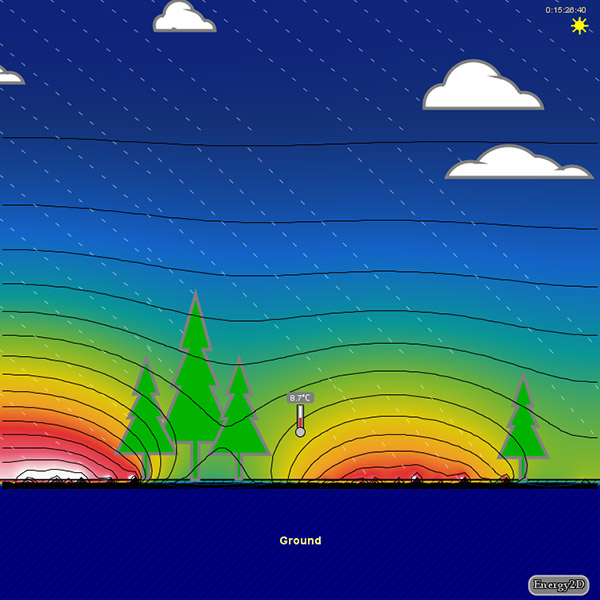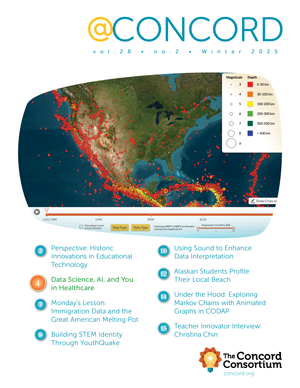News at Concord Consortium

Next Step Learning
The Concord Consortium, Next Step Living, and the Virtual High School are collaborating to create a technology-enhanced learning pathway from school to home and then to clean tech careers. The goal of the new three-year Next Step Learning project is to develop and test an education model that fuses science learning in school and energy efficiency at home. Students will use infrared cameras, sensors, simulations, and mixed-reality technologies to visualize, investigate, and design invisible heat and mass flows in real and virtual worlds. Over 2,000 students in diverse secondary schools across Massachusetts will participate in this research.
Towards Virtual Worlds
A new one-year project is exploring how to foster knowledge integration across disciplines. Middle school students will learn about ecosystems in the context of an ecosystems challenge, and later will be asked to address an air quality challenge. Researchers will examine (i) conditions under which learners form memories of their ecosystems experiences that allow them to address the air quality challenge and (ii) conditions under which learners want to improve their solutions to the ecosystem challenge after the air quality challenge. Lessons learned will inform the design of project challenges and virtual worlds with affordances for supporting knowledge integration across projects and disciplines.
Building Partnerships for Education and Speech Research
The sophistication of technologies for processing and understanding spoken language—such as speech recognition, detection of individual speakers, and natural language processing—have radically improved in recent years. These technologies can now automatically detect many features of speech—including questions, emotion and stress, and spoken keywords—with high accuracy. However, educational research has barely begun exploring their potential to provide insight into, and eventually revolutionize, research areas as diverse as collaboration, argumentation, discourse analysis, emotion, and engagement. This project—a partnership of the Concord Consortium, SRI International’s Center for Technology in Learning, the Speech Technology and Research Laboratory at SRI, and the Center for Robust Speech Systems at the University of Texas at Dallas—will help launch a new interdisciplinary field of study in spoken language technology for education.
Data Science Games
No significant problem facing society can be solved without the participation of people who have a deep understanding of how to work with data, but there are too few such people. Data Science Games will develop and test new data science games for high school biology, chemistry, and physics, and research how learners conceive of and learn with data. The data science games will be embedded in our Common Online Data Analysis Platform (CODAP). Data from the game will flow seamlessly into the CODAP environment, and high scores in the game can only be achieved through data modeling, thus increasing learners’ fluency with data science skills and concepts.
SmartCAD
The Concord Consortium, Purdue University, and the University of Virginia will conduct design-based research on Smart- CAD, a computer-aided design (CAD) system that supports secondary science and engineering with three embedded computational engines capable of simulating the mechanical, thermal, and solar performance of the built environment. These engines will allow SmartCAD to analyze student design artifacts on a scientific basis and provide automatic formative feedback to guide student design processes. The project will develop three curriculum modules based on the Learning by Design framework to support three design challenges: Solar Farms, Green Homes, and Quake-Proof Bridges. Research will investigate what types of feedback are effective in helping students attain the learning outcomes and under what conditions these types of feedback help students attain the outcomes.
Like Us, Follow Us
We’re thrilled to have you as friends and followers. Get the latest updates on happenings at the Concord Consortium by following us on these sites.
